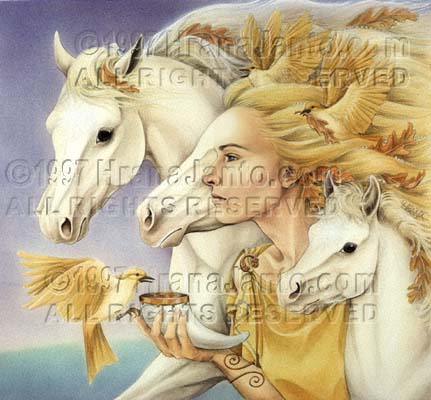 |
|
PREVIOUS | NEXT | A,B,C, D,E, F,G,H,I, J,K,L,M, N,O,P,Q, R,S, T,U,V,W,X,Y,Z | Help | ALL | INDEX
| Rhiannon from Goddesses and Heroines |
Exerpt from Goddess & Heroines by Patricia
Monaghan [Used by permission. This text is NOT included in the Goddess Oracle] |
Originally named Rigatona ("Great Queen"), she shrank in later legend into Rhiannon, a fairylike figure who appeared to Prince Pwyll of Dyfed near the gate of the underworld. He pursued her on his fastest horses, but hers--cantering steadily and without tiring--exhausted any mount of Pwyll's. Finally, the queen decided to stay with Pwyll; she bore him a son soon afterward.
What can one expect of a goddess of death? Her son disappeared, and the queen was found with blood on her mouth and cheeks. Accused of murder, she was sentenced to serve as Pwyll's gatekeeper, bearing visitors to the door on her back; thus she was symbolically transformed into a horse. All ended happily when her son was found; Rhiannon had been falsely accused by maids who, terrified at finding the babe absent, had smeared puppy blood on the queen's face.
Behind this legend is doubtless another, more primitive one in which the death queen actually was guilty of infanticide. This beautiful queen of the night would then, it seems, be identical to the Germanic Mora, the nightmare, the horse-shaped goddess of terror. But night brings good dreams as well as bad, so Rhiannon was said to be the beautiful goddess of joy and oblivion, a goddess of Elysium as well as the queen of hell.
| Back to TOP | Published by Llewellyn, copyright 1997. Used by permission of the author. |
![]()